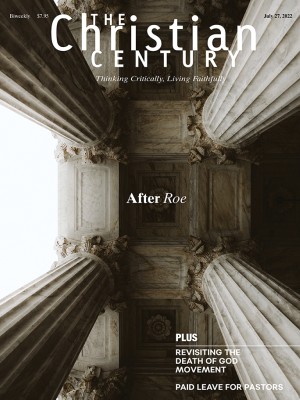An almost neon-bright sign hung on the cabinet in the gathering space, just outside the sanctuary. It said, in thick black marker, “What do we hope to GROW here?” Around 25 people from the congregation, leaders all, had gathered on a Tuesday evening in spring to ask and dream about what God might plant among them. I opened the meeting by quoting Paul: “I planted, Apollos watered, but God gave the growth” (1 Cor. 3:6). Bright pieces of Post-its surrounded the question with ideas of what that growth might look like: outreach, an even stronger music program, other possibilities. A few notes hung without words, inviting others not there that night to weigh in later with their dreams and hopes for the future.
Questions were posted on whiteboards: “What do we have?” “What do we need?” At the start of the meeting, those assembled were quiet, almost as though they held their collective breath. But these questions pierced through that tension. Against concern that there might not be a future, ideas fell out like rain that nourished the earth.
Read our latest issue or browse back issues.
As for what they lacked, only a few mentioned money. Yes, the budget seemed to lessen with each year. Still, money is never the core issue. Some mentioned staff, since lower attendance numbers had meant less money, which in turn meant less staff to help equip them for mission and ministry. Others talked about growing the numbers of those who would gather for worship, fellowship, and service. If one were to walk into that space and listen to those armed with Post-it notes and hope, it would not have sounded like a congregation whose future was in jeopardy. It would have sounded like a new day.
But was it? Their pastor had left just months before, and I had arrived just in time to walk alongside them for Holy Week and Easter. The pews were fuller on that Easter than they had been for some time, I was told. Careful and thoughtful expressions of feeling overwhelmed filled the space between us. “This hasn’t happened for years,” a member told me as they shook my hand and shook their head simultaneously. “I mean, who would have thought this could even happen?”
There was a need for outreach: How were we to connect with those around us if we didn’t make an effort and take a risk? A retirement community was being built across the street. What might happen if church members crossed the street and introduced themselves, hands outstretched in welcome and love? They had forgotten that their building was located on a busy suburban corner. How else might they reach the world? Was it time to join efforts with another congregation in order for their witness and work to grow strong once again? They weren’t sure just yet.
At the meeting, many people wrote on Post-its that they hoped to grow more community. They knew they had a strong core of folks. More than money, it seemed, one of the real longings for those who came together on that Tuesday night was community. “What does our wider community need?” another question read on yet another whiteboard. Affordable housing and child care were each a concern.
As the night drew to a close and Post-it notes filled boards and hearts and minds, people began to feel lighter, even more hopeful. They weren’t sure what exactly the future would hold, but they felt as though they had possibilities before them. Small pots filled with soil, a few seeds, and just a little water surrounded them. Would these seeds grow deep and strong? Would the congregation find nourishment enough that their hopes and dreams and longings might find full expression in their life together? To plant anything is a risk. There are no guarantees that it will become strong and fruitful. Still, we waited to see what may come.
The following Sunday, a few of the members met with me in my office. “We’ve tried all the things that were written down before,” one said. “I left the meeting deflated. I’ve given myself to this congregation. It seems as though nothing is going to break through. We’ll never grow. At this rate, we may even die.” Their suggestion was to figure out how many people the congregation actually still had. Would there be enough people to continue to make a go of things? Was there enough giving to sustain us? Was there enough energy? Could we survive much longer?
I felt the fear that welled up for them and prevented them from seeing what God could very well be trying to grow among them. I asked them about this, but they couldn’t see or imagine the possibility. “What if we’re slowly dying?” another one asked. “What if what we really need to do is to plan our funeral instead of moving in the direction of hope? What if all of this is one big failure waiting to happen?”
I didn’t tell them that planting anything, even hope, is risky. I didn’t tell them that despite our very best efforts, what we hoped to plant may fail. Even God has the experience of planting something only to watch it fail. Still, to risk hope is more than a failed attempt. To plant in hope of a fruitful future is already a sign of its fulfillment.






